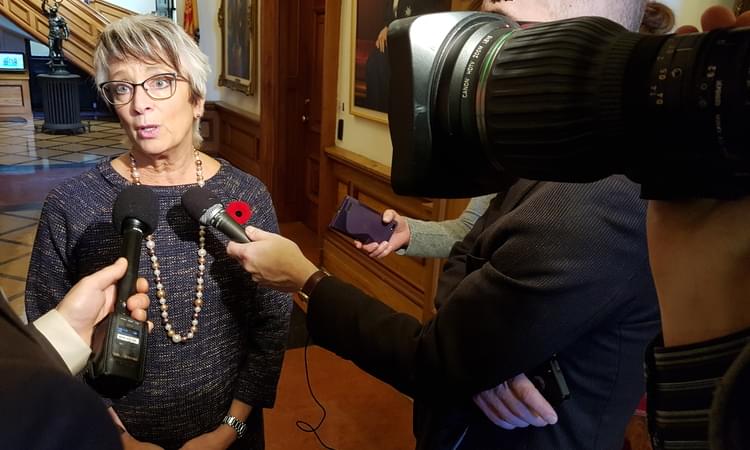Liberals accused of buying votes with $815M budget – Telegraph Journal – 8 November 2017

Author by: JOHN CHILIBECK Legislature Bureau
Photo by: JOHN CHILIBECK Legislature Bureau
It’s the same old problem. Governments refuse to provide the details of their capital budgets, preferring to unveil them later on when it serves them politically. That’s frustrating and speaks to a lack of transparency – David Coon
FREDERICTON • New Brunswick will spend $815 million on public projects during a provincial election year.
Finance Minister Cathy Rogers said the money earmarked in the 2018-19 capital budget for big-ticket items like schools, hospitals and roads would boost economic development, despite opposition criticism that her Liberal government was spending recklessly in the lead-up to the vote next September.
“Some would argue that we cannot afford these investments,” she said Wednesday in a speech on the floor of the legislature, a clear dig at the opposition Tories, who have warned the big spending program would leave future generations burdened with heavy debt.
“Your government believes that we cannot afford the consequences of ignoring these critical investments.”
Tory finance critic Bruce Fitch called it an election budget that would try to buy votes.
“People love new toys, but sometimes after they get them, the shine isn’t as bright,” Fitch told reporters. “There was no mention of the net debt and what effect it will have here.”
The veteran politician said his party would ask further questions about the provincial government debt – closing in on $14 billion and growing – once the capital budget estimates are studied more closely in committee meetings.
Of the total amount, $768 million will be covered by provincial taxpayers, while $47 million will come from Ottawa and other contributors.
Most of the money – $787 million – is to continue infrastructure projects such as upgrades to the Dr. Everett Chalmers Regional Hospital in Fredericton and the historic site on Ministers Island near Saint Andrews that will take several years to complete. Just over $28 million is for new projects.
The last time a provincial election was in the offing, in 2014, the Progressive Conservative government of the day forged a capital budget of $555 million, according to public accounts published by the provincial office of the comptroller. Sarah Bustard, a Finance Department spokeswoman, said this included assistance from the federal government and other contributors.
That means the $815 million announced for next year is $260 million higher than the Tory capital budget during the 2014 election year.
Big-ticket spending has also steadily increased during the Liberals’ three years in power.
In their first full year in control in fiscal year 2015-16, the capital spending was $571 million – more than $240 million less than the latest announcement.
But Rogers said it was untrue the Liberals were ramping up spending next year just to win votes.
“I do not believe this is about an election year; it’s about investing where the priorities are and where we can get a return,” she told reporters. “It takes time to make a plan, and so we built our foundation in 2014 and we’re building on that.”
The finance minister said as an example, the government was looking more closely at midlife repairs to infrastructure rather than waiting longer and a fix becomes more costly. She also said much of the spending depended on leveraging money from Ottawa that wasn’t available earlier on.
She said if the spending had remained level with four years ago, New Brunswickers wouldn’t be happy.
“We want to focus on top-quality learning environments and state-of-the-art health infrastructure.”
One of the biggest boosts is for tourism. The government is spending $12.6 million on parks, trails, historic sites and the like, breaking last year’s record of just over $10 million.
Green Party Leader David Coon said there just wasn’t enough information in Wednesday’s announcement to pass judgment.
“It’s the same old problem. Governments refuse to provide the details of their capital budgets, preferring to unveil them later on when it serves them politically. That’s frustrating and speaks to a lack of transparency.”